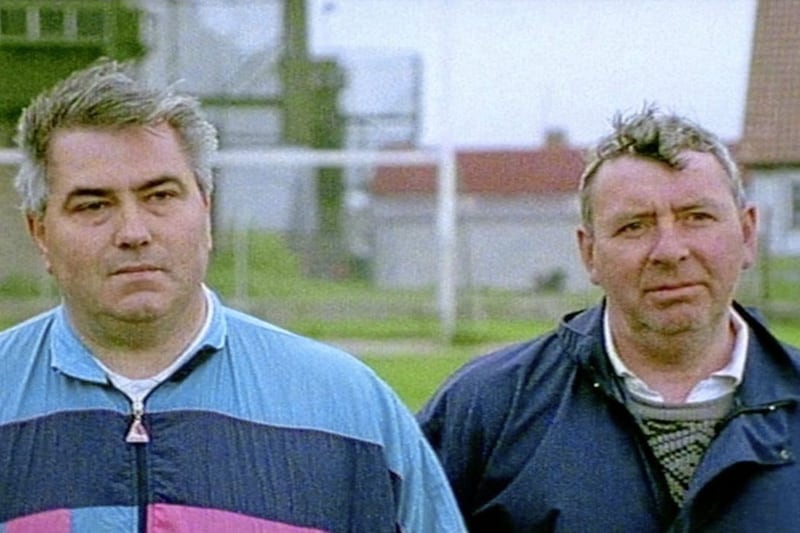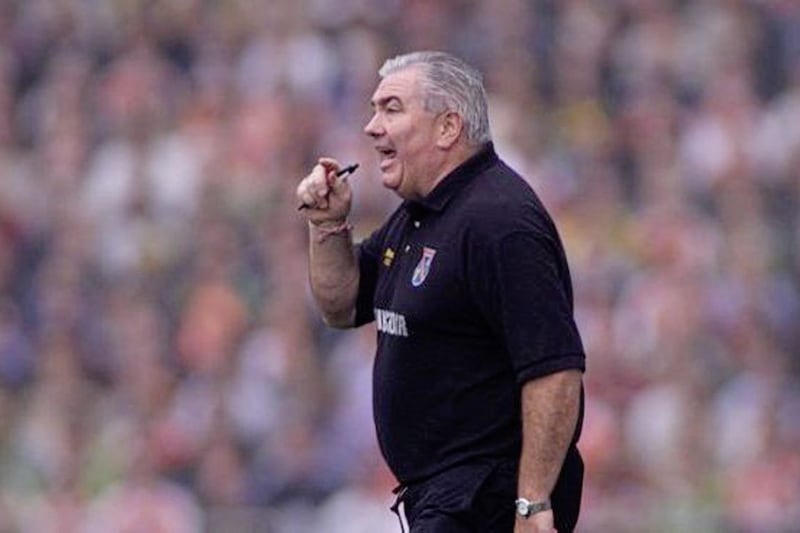NEXT month, we will see the introduction of another new addition to the modern game, the ‘mark’.
This latest change will supposedly lead to a resurgence of high fielding in the middle of the field which, as we all know, is a rarely seen talent.
Not surprisingly, an old mate and playing partner of mine, Jarlath Burns, was one of the men behind the mark’s introduction as he fetched many a high ball during his county and club career.
At a recent talk night, I asked ‘Wee’ James McCartan for his opinion on this new rule and he quipped that Jarlath always wanted the mark introduced so he could catch one of his toe taps, which were extraordinarily high at times. I have to admit it was quite a funny comment, even for James.
This new rule has received plenty of negative publicity, probably because a lot of people fail to see how it will radically improve our game, while the fact it was rushed in when there are more pressing matter affecting our games - club versus county and the GAA calendar - also rankles in places.
The other reason it has not been viewed more positively is because it comes soon after the introduction of the black card which, in my opinion and that of many others, is exceptionally infuriating.
Players are getting more and more frustrated with the black card, and referees are even more unpopular than ever before, which I honestly didn’t think was possible.
I’m not sure how much impact the mark will have and I don’t see it primarily as a chance to revisit the days of brilliant fielding from the likes of Jack O’Shea.
However, I do see it as a chance to rid ourselves of what many see as a necessity in the modern game but I see as a reason why our games are no longer compelling viewing - the dependency on the shortened kick-out.
Too many times, we see county teams in big matches surrendering kick-outs and not even challenging for possession because they are more concerned with getting into a defensive shape which they think will limit the potency of the opposition’s attack by getting bodies behind the ball and suffocating the life out of the forwards.
Our games are rapidly becoming possession, strength and athleticism-based with sideways passes rather than forward momentum occupying huge chunks of the game.
Football has become more like basketball, with teams building from a short kick-out and carrying the ball with a series of short passes towards the opposition goals.
The actual kick-out has changed so much that all modern goalkeepers are coached to kick short and challenged to perfect the art.
So vital has that ability become that we are told Kerry were actually contemplating playing Bryan Sheehan in goal in their
All-Ireland semi-final against Dublin, ahead of a natural goalkeeper, because of his kicking prowess from the ground, regardless of his ability in goal.
Look at the debacle ahead of the All-Ireland final replay when a goalkeeper who was having a great season, Mayo’s David Clarke, was dropped for one, Rob Hennelly, who is slightly more accurate.
From that example alone you can see the importance county managers are placing on keeping possession from kick-outs, to the point that the idea of a goalkeeper hitting a long kick-out is now seen as a sign of weakness.
Many watching the modern game bemoan the lack of physicality on show, particularly between the 45s, as the emphasis on short kick-outs has ensured we no longer have the midfield battles of old, those physical contests for the high ball and the breaking ball.
Basically, we are by-passing midfield and playing a rugby union-type game, with very fit and muscular players carrying the ball into the tackle and off-loading to the running man on his wing which is not what we were used to 20 years ago.
We are missing out on those old school midfield skirmishes and collisions that dominated our games, not just on the field but on the way home as well.
I suppose it’s a bit ironic that I am writing a column supporting a return to some form of longer kick-out when I was criticised during my career for a lack of distance on my kicks.
Yet, the big hitters from my era would now be deemed as surplus to requirements. In those days, the further you could hoke it out, the better you were as a goalkeeper, while nowadays a 30-yard kick-out to a man wearing your county colours is deemed as essential, which shows you just how far the game has evolved in the last two decades.
We actually don’t need big, physical midfielders nowadays as they are more or less redundant under this practically compulsory kick-out regime.
While I am not sure whether the mark will have any major influence on the game or not, I would urge people to give it a chance as it may well tempt goalkeepers and managers into believing they have an option outside the 20- or 30-yard kick-out, which is doing our game more harm than good.
******

I WOULD like to take this opportunity to pass on my condolences to the family of Danny Murphy after his death on Wednesday.
Danny was the Ulster Council’s long-time secretary and he was exceptionally dedicated to the role. I met Danny at numerous functions and his verve and enthusiasm for our association was always evident.
His loss will be deeply felt, not only within the GAA but throughout the wider sporting community of Ulster.
Ar dheis Dé go raibh a anam.







